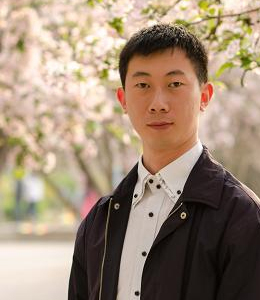
吕兴洋
系 别:旅游管理系
职 称:教授、博士生导师
电子邮箱:lvxingyang@swufe.edu.cn
主讲课程:旅游市场营销、旅游目的地营销、旅游研究方法、休闲与旅游概论等课程
教育背景:
2010-2013 南开大学 旅游与服务学院 博士
2007-2010 北京第二外国语学院 旅游管理学院 硕士
2003-2007 华中师范大学 数学与统计学学院 数学与应用数学系 学士
个人简介:
西南财经大学工商管理学院旅游系教授、博士生导师,四川省“天府青城计划”社科菁英、四川省学术技术带头人后备人选,四川省旅游业青年专家。Tourism Management编委、《旅游科学》领域主编、《旅游导刊》和《旅游论坛》青年委员,研究方向为旅游市场营销。在Tourism Management、Annals of Tourism Research、《旅游学刊》等SSCI、CSSCI期刊发表论文90余篇,11篇文章入选ESI Top 1%高被引论文。主持国家自然科学基金、国家社会科学基金、教育部人文社会科学基金、四川省科技厅软科学项目、四川省社会科学基金等10余项研究课题。
2017、2018、2020、2021年四次获“西南财经大学优秀教师”称号;
2018年获西南财经大学“唐立新优秀教学教师奖”;
2017年、2019年分别被评为第四届、第五届西南财经大学“我心目中的好老师”;
2014年-2019年、2021年七次被评为西南财经大学工商管理学院优秀教学工作者;
2017年-2021年连续五年被评为西南财经大学工商管理学院优秀科研工作者;
主持研究课题:
[1] 主持:国家自然科学基金面上项目“脑奖赏效应下感官线索对旅游冲动的诱发机制与动力过程研究”(72472129),2025-2028.
[2] 主持:国家社会科学基金青年项目“西南地区滑雪旅游产业竞争潜力评价及路径选择研究”(17CTY014),2017-2020.
[3] 主持:教育部人文社会科学研究规划基金(面上项目)“红色旅游的精神内化机制及对精神文明现代化的推动作用研究”(23YJA630072),2023-2025.
[4] 主持:教育部人文社会科学研究规划基金(青年基金)“品牌劫持:旅游目的地品牌形象演化机制及影响研究”(15YJC630086),2016-2018.
[5] 主持:四川省科技厅软科学项目“城市人才争夺中四川省中小城市人才吸引策略研究——基于城市软实力的视角”,(2021JDR0152),2021-2023.
[6] 主持:四川省科技厅软科学项目“体育赛事与城市文化的耦合共生关系与发展路径研究”,(2017ZR0308),2017-2020.
[7] 主持:四川省社会科学规划项目“体育旅游产业生态系统构建、纵深推进与协同治理研究”(SC21B138),2021-2022.
[8] 主持:四川省旅游发展委员会旅游业青年专家培养项目“四川省体育与旅游产业融合发展研究”(SCTYETP2016L20),2016-2018.
[9] 主持:成都市科技局软科学项目“体育赛事对成都城市形象的提升作用研究”(2017-RK00-00031-ZF),2017-2019.
[10] 主持:成都市哲学社会科学规划项目“基于品牌化策略的成都赛事名城建设纵深推进研究”(YY2220200204),2020-2021.
代表性研究成果:
[1] Lv, X., Feng, P., Chen, Q., Huang, X., & Fu, X. (2025). Peaks and troughs: are heart rate cues more attractive to tourists? Tourism Management, 108, 105098.
[2] Lv, X., Yuan, Z., Wan, F., Lan, T., & Oren, G. (2025). Do tourists experience suffering when they touch the Wailing Wall? Tourism Management, 106, 105021.
[3] Lv, X., Zhang, C., & Li, C. (2024). Beyond image attributes: A new approach to destination positioning based on sensory preference. Tourism Management, 100, 104819.
[4] Lv, X., Zhang, K., Song, Q., Fu, X., & Liu, Y. (2024). How does occupational stigma and work dirtiness inhibit hotel front-line employees' proactive customer service performance and its solutions? Tourism Management, 104, 104932.
[5] Lv, X., Shi, K., He, Y., Ji, Y., & Lan, T. (2024). My colleague is not “human”: Will working with robots make you actmore indifferently. Journal of Business Research, 176, 114585.
[6] Lv, X., Yuan, Z., Luo, J., Fu, X., Shen, H., Ai, J., & Shen, Y. (2024). Purchase and protect: Dual effects of tourist souvenir customization. Journal of Travel Research, https://doi.org/10.1177/00472875241269819
[7] Sun, J., Lv, X*. (2024). Red heart at dark sites: The production of embodied patriotic ritual in tourism. Tourism Management, 106, 104975.
[8] Qiu, W., Li, Y., Fu, X., Yu, X., & Lv, X*. (2024). When Guests Become Hosts: The Boomerang Effect of Tourists’ Negative Behaviors on Their Country of Origin. Journal of Travel Research, https://doi.org/10.1177/00472875241291146
[9] Lv, X., Shi, K., Xu, S., & Wu, A. (2023). Will tourists’ pro-environmental behavior influence their well-being? An examination from the perspective of warm glow theory. Journal of Sustainable Tourism, 32(8), 1453-1470.
[10] Lv, X., Pan, X., Xu, S., & Lan, T. (2023). The impact of tourist engagement on low–carbon behavior in glacier tourism. Journal of Sustainable Tourism, 32(12), 2479-2499.
[11] Lv, X., Tang, R., Luo, J., Zhang, M., & Li, Q. (2023). I join, so I enjoy: How customer participation increases wellbeing. Journal of Happiness Studies, 24, 2783-2811.
[12] Lv, X., Luo, J., Liang, Y., Liu, Y., & Li, C. (2022). Is cuteness irresistible? The impact of cuteness on customers’ intentions to use AI applications. Tourism Management, 90, 104472.
[13] Lv, X., Lu, R., Xu, S., Sun, J., & Yang, Y. (2022). Exploring visual embodiment effect in dark tourism: The influence of visual darkness on dark experience. Tourism Management, 89, 104438.
[14] Lv, X., Luo, H., Xu, S., Sun, J., Lu, R. & Hu, Y*. (2022). Dark tourism spectrum: Visual expression of dark experience. Tourism Management, 93, 104580.
[15] Lv, X., Zhang, R., & Li, Q. (2021). Value co-destruction: The influence of failed interactions on members’ behaviors in online travel communities. Computers in Human Behavior, 122, 106829.
[16] Lv, X., Zhang, R., Su, Y., & Yang, Y. (2022). Exploring how live streaming affects immediate buying behavior and continuous watching intention: A multigroup analysis. Journal of Travel and Tourism Marketing, 39(1), 109-135.
[17] Lv, X., Liang, Y., Luo, J., & Liu, Y. (2022). Icing on the cake or gilding the lily? The impact of high-modified model images on purchase intention. Journal of Retailing and Consumer Services, 68, 103078.
[18] Lv, X., Yang, Y., Qin, D., Cao, X., & Xu, H. (2021). Artificial intelligence service recovery: The role of empathic response in hospitality customers' continuous usage intention. Computers in Human Behavior, 126(1), 106993.
[19] Lv, X., Liu, Y., Xu, S., & Li, Q. (2021). Welcoming host, cozy house? The impact of service attitude on sensory experience. International Journal of Hospitality Management, 95(1), 102949.
[20] Lv, X., Liu, Y., Luo, J., Liu, Y., & Li, C. (2021). Does a cute artificial intelligence assistant soften the blow? The impact of cuteness on customer tolerance of assistant service failure. Annals of Tourism Research, 87, 103114.
[21] Sun, J., & Lv, X.* (2021). Feeling dark, seeing dark: Mind-body in dark tourism. Annals of Tourism Research, 86, 103087.
[22] Lv, X., Li, C., & McCabe, S. (2020). Expanding theory of tourists’ destination loyalty: The role of sensory impressions. Tourism Management, 77, 104026.
[23] Lv, X., Li, H., & Xia, L. (2020). Effects of haptic cues on consumers’ online hotel booking decisions: The mediating role of mental imagery. Tourism Management, 77, 104025.
[24] 吕兴洋, 刘涛, 谢小凤, 黄雷, 张凤英. 回忆疗愈:过往旅游经历对老年人不幸福感的治愈作用研究[J]. 旅游学刊, 2023, 38(6):74-89.
[25] 吕兴洋, 骆晶晶, 唐孜彦. 红色旅游仪式感对青少年在线契合行为的影响研究[J]. 旅游学刊, 2022, 38(3):77-91.
[26] 吕兴洋, 吴艾凌, 李惠璠. 基于品牌感官印象的旅游目的地差异化定位——以成都4个古镇为例[J]. 旅游学刊, 2022, 37(04): 93-103.
[27] 吕兴洋, 杨玉帆, 许双玉, 刘小燕. 以情补智:人工智能共情回复的补救效果研究[J]. 旅游学刊, 2021, 36(08): 86-100.
[28] 吕兴洋, 徐海军, 谭慧敏, 刘小燕. 声音营销力:目的地歌曲对潜在旅游者的影响研究——以歌曲《成都》为例[J]. 旅游学刊, 2020, 35(05): 124-138.
[29] 吕兴洋, 李春晓, 李惠璠. 感官印象:旅游者忠诚的增益解[J]. 旅游学刊, 2019, 34(10): 47-59.
[30] 吕兴洋. 目的地形象的感官营销思考[J]. 旅游学刊, 2018, 33(03): 7-8.
[31] 吕兴洋, 刘小燕, 谭慧敏. 奖励对顾客网络口碑的影响与替代手段的寻求——以餐饮企业的点评返现活动为例[J]. 旅游学刊, 2018, 33(10): 75-86.
[32] 吕兴洋, 谭慧敏, 李惠璠. 非品牌酒店的机会?预订渠道转换下的消费者品牌敏感研究[J]. 旅游学刊, 2017, 32(6): 96-108.
[33] 吕兴洋, 邱玮, 刘祥艳. 旅游者异质性对目的地绩效的影响研究[J]. 旅游学刊, 2016, 31(9): 72-79.
[34] 吕兴洋, 沈雪瑞, 梁佳. 在线信息搜索对目的地感知形象演化影响研究[J]. 旅游学刊, 2015, 30(10): 70-79.
[35] 吕兴洋,徐虹,林爽.品牌劫持:旅游目的地形象异化演进过程研究[J]. 旅游学刊, 2014, 29(06): 67-75.

